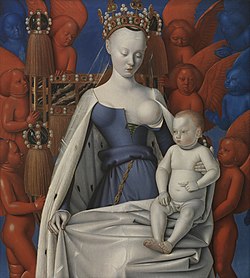Agnès Sorel
Agnès Sorel | |
|---|---|
 | |
| Born | 1421 |
| Died | February 9, 1450 (aged 28) |
| Spouse | None |
| Children | Charlotte de Valois Marguerite de Valois Jeanne de Valois |
| Parent(s) | Jean Soreau Catherine de Maignelais |
Agnès Sorel [1] (1421 – February 9, 1450), surnamed Dame de beauté, was a mistress of King Charles VII of France.
Life in the royal court
The daughter of a soldier, Jean Soreau, and of Catherine de Maignelais, Sorel was twenty years old when she was first introduced to King Charles. At that time, she was holding a position in the household of Rene I of Naples, Charles' brother-in-law. As reflected in art of the day, she was an extraordinarily beautiful young woman, and was also extremely intelligent. The French king was immediately smitten by her charms and he gave her the Château de Loches as her private residence, and took her as his mistress. [2]
Soon, her presence was felt at the royal court in Chinon where her company was alleged to have brought the king out of a protracted depression. She had a very strong influence on the king, and that, in addition to her extravagant tastes, earned her a number of powerful enemies at court. [3]
Illegitimate children, suspicious death

Agnès gave birth to three daughters: Marie de Valois and Charlotte and Jeanne de France. While pregnant with their fourth child, she joined Charles on the campaign of 1450 in Jumièges, wanting to be with him as moral support. There, she suddenly became ill and died on February 9 at the age of 28. While the cause of death was originally thought to be dysentery, scientists have now concluded that Agnès died from being poisoned by mercury, making it likely that she was a victim of murder, with suspects being unknown.
Charles' son, the future King Louis XI, had been in open revolt against his father for the previous four years. It has been speculated that he poisoned Agnès in order to remove what he may have considered her undue influence over the king. It was also speculated that French financier, noble and minister Jacques Coeur poisoned her, though that theory is widely discredited as an attempt to remove Coeur from the French court. In 2005 French forensic scientist Philippe Charlier examined her remains and determined that the cause of death was mercury poisoning, but offered no opinion about whether she was murdered.[4] Mercury was sometimes used in cosmetic preparations and this could therefore have been the reason for her death.
Her cousin Antoinette de Maignelais took her place as mistress to the king after her death.
Agnès Sorel in the Arts
- Two Russian operas from the late 19th century portray Agnès Sorel (and Charles VII) among the dramatis personae. These are Pyotr Tchaikovsky's The Maid of Orleans and César Cui's The Saracen.
Publication
- Duquesne, Vie et Aventures galantes de la belle Sorel, (Paris, 1909)
